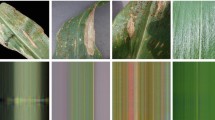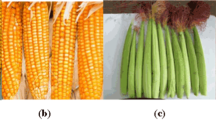Abstract
Disease attack on crops is one of the most serious threats to the global food supply chain. A proper, comprehensive and systematic solution is required for the early recognition of diseases and to reduce the overall crop loss. In this regard, deep learning techniques (especially convolutional neural networks (CNNs/ConvNets)) are being successfully applied for automatically recognizing the diseases of crops using digital images. This study proposes a novel 15-layer deep convolutional neural network (CNN) model for recognizing the diseases of maize crop. Around 3852 images of maize crop were collected from the PlantVillage data-repository. This dataset contains leaf images of three diseases viz. gray Leaf Spot (GLS), Common Rust (CR) and Northern Corn Leaf Blight (NCLB) as well as the healthy ones. The proposed model showed significant results for recognizing the unseen diseased images of the maize crop. We also employed a few popular pre-trained networks in the transfer learning approach for training on the maize dataset. We presented the comparative performance analysis between the proposed model and the pre-trained models in the result section of the manuscript. The experimental findings reported that our proposed model showed 3.2% higher prediction performance with 3 × lesser trainable parameters than the best-performing pre-trained network (i.e., DenseNet121). The overall performance analysis reported that the proposed CNN model is very effective in identifying the images of maize diseases and also performs quite better than the popular pre-trained models.










Similar content being viewed by others
Explore related subjects
Discover the latest articles, news and stories from top researchers in related subjects.Data availability
The dataset used and analysed in this study is publicly available in https://github.com/spMohanty/PlantVillage-Dataset
Notes
A heatmap is a graphical representation of data in matrix form where each value of a matrix is represented as different shades of single color model.
Matplotlib is a comprehensive python package for data visualization.
References
United Nations, Department of Economic and Social Affairs, Population Division (2019). World Population Prospects 2019: Highlights (ST/ESA/SER.A/423)
Kaur H, Kumar S, Hooda KS et al (2020) Leaf stripping: an alternative strategy to manage banded leaf and sheath blight of maize. Indian Phytopathol 73(2):203–211. https://doi.org/10.1007/s42360-020-00208-z
FAOSTAT (2021) Statistical Database of the Food and Agriculture of the United Nations. In: FAO. http://www.fao.org. Accessed 4 Jun 2021
Annual Maize Progress Report Kharif 2020. ICAR-IIMR, PAU Campus, Ludhiana 141004
Oerke EC, Dehne HW (2004) Safeguarding production - Losses in major crops and the role of crop protection. Crop Prot 23(4):275–285. https://doi.org/10.1016/j.cropro.2003.10.001
Donatelli M, Magarey RD, Bregaglio S et al (2017) Modelling the impacts of pests and diseases on agricultural systems. Agric Syst 155:213–224. https://doi.org/10.1016/j.agsy.2017.01.019
LeCun Y, Bengio Y, Hinton G (2015) Deep learning. Nature 521(7553):436–444
Kamilaris A, Prenafeta-Boldú FX (2018) Deep learning in agriculture: a survey. Comput Electron Agric 147:70–90
Haque MA, Marwaha S, Arora A et al (2021) Image-based identification of maydis leaf blight disease of maize (Zea mays) using deep learning. Indian J Agric Sci 91(9):1362–1367
Hughes DP, Salathé M (2016) An open access repository of images on plant health to enable the development of mobile disease diagnostics. arXiv preprint arXiv:1511.08060
Mohanty SP, Hughes DP, Salathé M (2016) Using deep learning for image-based plant disease detection. Front Plant Sci 7:1–20. https://doi.org/10.3389/fpls.2016.01419
Krizhevsky A, Sutskever I, Hinton GE (2012) ImageNet classification with deep convolutional neural networks. In: Advances in neural information processing systems. p 25
Szegedy C, Liu W, Jia Y et al (2015) Going deeper with convolutions. In: Proceedings of the IEEE computer society conference on computer vision and pattern recognition. pp 1–9
DeChant C, Wiesner-Hanks T, Chen S et al (2017) Automated identification of northern leaf blight-infected maize plants from field imagery using deep learning. Phytopathology 107(11):1426–1432. https://doi.org/10.1094/PHYTO-11-16-0417-R
Zhang X, Qiao Y, Meng F et al (2018) Identification of maize leaf diseases using improved deep convolutional neural networks. IEEE Access 6:30370–30377. https://doi.org/10.1109/ACCESS.2018.2844405
Sibiya M, Sumbwanyambe M (2019) A computational procedure for the recognition and classification of maize leaf diseases out of healthy leaves using convolutional neural networks. AgriEngineering 1(1):119–131. https://doi.org/10.3390/agriengineering1010009
Priyadharshini RA, Arivazhagan S, Arun M, Mirnalini A (2019) Maize leaf disease classification using deep convolutional neural networks. Neural Comput Appl 31(12):8887–8895. https://doi.org/10.1007/s00521-019-04228-3
LeCun Y, Bottou L, Bengio Y, Haffner P (1998) Gradient-based learning applied to document recognition. In: Proceedings of the 86th IEEE pp 2278–2324 https://doi.org/10.1109/5.726791
Lv M, Zhou G, He M et al (2020) Maize leaf disease identification based on feature enhancement and DMS-robust alexnet. IEEE Access 8:57952–57966. https://doi.org/10.1109/ACCESS.2020.2982443
Waheed A, Goyal M, Gupta D et al (2020) An optimized dense convolutional neural network model for disease recognition and classification in corn leaf. Comput Electron Agric 175:105456. https://doi.org/10.1016/J.COMPAG.2020.105456
Huang G, Liu Z, van der Maaten L, Weinberger KQ (2017) Densely connected convolutional networks. In: Proceedings of 30th IEEE conference on computer vision and pattern recognition pp 4700–4708
Chen J, Wang W, Zhang D et al (2021) Attention embedded lightweight network for maize disease recognition. Plant Pathol 70(3):630–642. https://doi.org/10.1111/ppa.13322
Ward JMJ, Stromberg EL, Nowell DC, Nutter FW (1999) Gray leaf spot: A disease of global importance in maize production. Plant Dis 83(10):884–895. https://doi.org/10.1094/PDIS.1999.83.10.884
Aggarwal SK, Gogoi R, Rakshit S (2021) Major Diseases of maize and their management. IIMR Technical Bulletin 2021-04. ICAR-IIMR, Ludhiana
Hooda KS, Khokhar MK, Shekhar M et al (2017) Turcicum leaf blight—sustainable management of a re-emerging maize disease. J Plant Dis Prot 124(2):101–113
Géron A (2017) Hands-on machine learning with Scikit-Learn and TensorFlow: concepts, tools, and techniques to build intelligent systems. O'Reilly Media, Inc
Scotti F (2005) Automatic morphological analysis for acute leukemia identification in peripheral blood microscope images. In: Proceedings of the 2005 IEEE international conference on computational intelligence for measurement systems and applications pp 96–101
Goodfellow I, Bengio Y, Courville A (2016) Deep learning. MIT press, Cambridge
Gu J, Wang Z, Kuen J et al (2018) Recent advances in convolutional neural networks. Pattern Recogn 77:354–377. https://doi.org/10.1016/J.PATCOG.2017.10.013
Zhang A, Lipton ZC, Li M, Smola AJ (2021) Dive into deep learning. arXiv preprint arXiv:2106.11342
Haque MA, Marwaha S, Deb CK et al (2022) Deep learning-based approach for identification of diseases of maize crop. Sci Rep 12(1):6334. https://doi.org/10.1038/S41598-022-10140-Z
Atila Ü, Uçar M, Akyol K, Uçar E (2021) Plant leaf disease classification using EfficientNet deep learning model. Eco Inform 61:101182. https://doi.org/10.1016/j.ecoinf.2020.101182
Deng J, Dong W, Socher R, et al (2009) ImageNet: a large-scale hierarchical image database. In: Conference on computer vision and pattern recognition, IEEE pp. 248–255. https://doi.org/10.1109/CVPR.2009.5206848
Simonyan K, Zisserman A (2015) Very deep convolutional networks for large-scale image recognition. In: 3rd international conference on learning representations. arXiv preprint arXiv:1409.1556
Szegedy C, Vanhoucke V, Ioffe S et al (2016) Rethinking the Inception Architecture for Computer Vision. In: Proceedings of the IEEE computer society conference on computer vision and pattern recognition pp 2818–2826
He K, Zhang X, Ren S, Sun J (2016) Deep residual learning for image recognition. In: Proceedings of the IEEE computer society conference on computer vision and pattern recognition pp 770–778
Chollet F (2017) Xception: Deep learning with depthwise separable convolutions. In: Proceedings - 30th IEEE conference on computer vision and pattern recognition pp 1251–1258
Sandler M, Howard A, Zhu M, et al (2018) MobileNetV2: Inverted Residuals and Linear Bottlenecks. In: Proceedings of the IEEE computer society conference on computer vision and pattern recognition pp 4510–4520
Zoph B, Vasudevan V, Shlens J, Le QV (2018) Learning Transferable Architectures for Scalable Image Recognition. In: Proceedings of the IEEE computer society conference on computer vision and pattern recognition pp 8697–8710
Tan M, Le QV (2019) EfficientNet: rethinking model scaling for convolutional neural networks. In: 36th international conference on machine learning pp 6105–6114
Abadi M, Agarwal A, Barham P et al (2016) TensorFlow: large-scale machine learning on heterogeneous distributed systems. arXiv preprint arXiv:1603.04467
Selvaraju RR, Cogswell M, Das A et al (2017) Grad-CAM: Visual Explanations from Deep Networks via Gradient-based Localization. In: Proceedings of international conference on computer vision pp 618–626
Acknowledgements
This study has been supported by the National Agricultural Science Funds (NASF), ICAR and National Agricultural Higher Education Project (NAHEP), ICAR.
Author information
Authors and Affiliations
Contributions
MH, SM and AA conceived the study. MH conducted the experiments and implemented the models described. MH, CK and SN analysed the results and wrote the manuscript.
Corresponding author
Ethics declarations
Conflict of interest
The author(s) declare no competing interests.
Additional information
Publisher's Note
Springer Nature remains neutral with regard to jurisdictional claims in published maps and institutional affiliations.
Rights and permissions
Springer Nature or its licensor (e.g. a society or other partner) holds exclusive rights to this article under a publishing agreement with the author(s) or other rightsholder(s); author self-archiving of the accepted manuscript version of this article is solely governed by the terms of such publishing agreement and applicable law.
About this article
Cite this article
Haque, M.A., Marwaha, S., Deb, C.K. et al. Recognition of diseases of maize crop using deep learning models. Neural Comput & Applic 35, 7407–7421 (2023). https://doi.org/10.1007/s00521-022-08003-9
Received:
Accepted:
Published:
Issue Date:
DOI: https://doi.org/10.1007/s00521-022-08003-9




